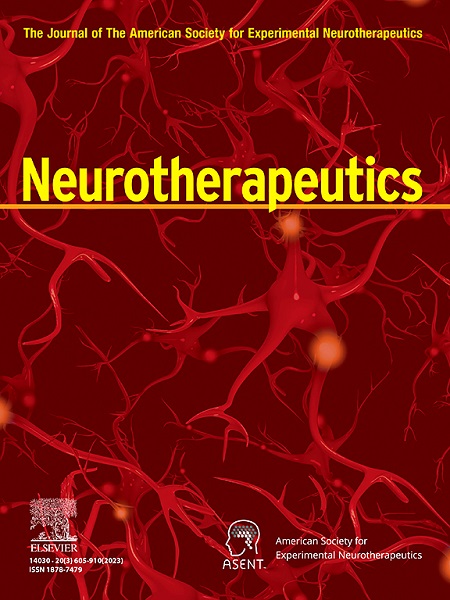MeCP2 基因疗法可改善皮特-霍普金斯综合征小鼠模型的疾病表型。
IF 5.6
2区 医学
Q1 CLINICAL NEUROLOGY
引用次数: 0
摘要
神经发育障碍皮特-霍普金斯综合症(PTHS)的临床症状与雷特综合症(RTT)患者相似。然而,RTT 是由 MECP2 基因突变引起的,而 PTHS 则是由 TCF4 基因突变引起的。这两种疾病的机理共性尚不清楚,但它们的共同症状表明可能存在趋同的通路级干扰。我们将患者皮肤衍生成纤维细胞重新编程为诱导神经元祖细胞。有趣的是,我们发现与健康对照组相比,PTHS 患者 iNPCs 的 MeCP2 水平降低,而且 iNPCs 和 iAstrocytes 都以突变特异性的方式显示出功能和分化缺陷。当 Tcf4+/- 小鼠与过表达 MeCP2 的小鼠进行基因杂交时,分子和表型缺陷明显改善,突出了 MeCP2 在 PTHS 病理中的重要作用。重要的是,用表达 MeCP2 的 9 号血清型腺相关病毒载体(AAV9)(AAV9.P546.MeCP2)进行出生后脑室内基因替代治疗,可显著改善 iNPC 和 iAstrocyte 的功能,并有效改善 Tcf4+/- 小鼠的组织学和行为学缺陷。综上所述,我们的数据表明,MeCP2 在 PTHS 病理学中的作用以及在多种神经发育障碍中可能受影响的共同通路之前是未知的。我们的研究突显了 PTHS 潜在的新型治疗靶点,包括上调 MeCP2 表达或其下游靶点,或潜在的基于 MeCP2 的基因疗法。本文章由计算机程序翻译,如有差异,请以英文原文为准。
MeCP2 gene therapy ameliorates disease phenotype in mouse model for Pitt Hopkins syndrome
The neurodevelopmental disorder Pitt Hopkins syndrome (PTHS) causes clinical symptoms similar to Rett syndrome (RTT) patients. However, RTT is caused by MECP2 mutations whereas mutations in the TCF4 gene lead to PTHS. The mechanistic commonalities underling these two disorders are unknown, but their shared symptomology suggest that convergent pathway-level disruption likely exists. We reprogrammed patient skin derived fibroblasts into induced neuronal progenitor cells. Interestingly, we discovered that MeCP2 levels were decreased in PTHS patient iNPCs relative to healthy controls and that both iNPCs and iAstrocytes displayed defects in function and differentiation in a mutation-specific manner. When Tcf4+/− mice were genetically crossed with mice overexpressing MeCP2, molecular and phenotypic defects were significantly ameliorated, underlining and important role of MeCP2 in PTHS pathology. Importantly, post-natal intracerebroventricular gene replacement therapy with adeno-associated viral vector serotype 9 (AAV9)-expressing MeCP2 (AAV9.P546.MeCP2) significantly improved iNPC and iAstrocyte function and effectively ameliorated histological and behavioral defects in Tcf4+/− mice. Combined, our data suggest a previously unknown role of MeCP2 in PTHS pathology and common pathways that might be affected in multiple neurodevelopmental disorders. Our work highlights potential novel therapeutic targets for PTHS, including upregulation of MeCP2 expression or its downstream targets or, potentially, MeCP2-based gene therapy.
求助全文
通过发布文献求助,成功后即可免费获取论文全文。
去求助
来源期刊

Neurotherapeutics
医学-神经科学
CiteScore
11.00
自引率
3.50%
发文量
154
审稿时长
6-12 weeks
期刊介绍:
Neurotherapeutics® is the journal of the American Society for Experimental Neurotherapeutics (ASENT). Each issue provides critical reviews of an important topic relating to the treatment of neurological disorders written by international authorities.
The Journal also publishes original research articles in translational neuroscience including descriptions of cutting edge therapies that cross disciplinary lines and represent important contributions to neurotherapeutics for medical practitioners and other researchers in the field.
Neurotherapeutics ® delivers a multidisciplinary perspective on the frontiers of translational neuroscience, provides perspectives on current research and practice, and covers social and ethical as well as scientific issues.
 求助内容:
求助内容: 应助结果提醒方式:
应助结果提醒方式:


